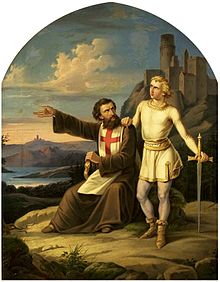
Back Конрад Валенрод (паэма) Byelorussian Конрад Валенрод (паэма) BE-X-OLD Konrád Wallenrod Czech Konrad Wallenrod German Conrad Wallenrod French Konrad Wallenrod (powieść poetycka) Polish Конрад Валленрод (поэма) Russian Konrad Wallenrod Turkish Конрад Валленрод Ukrainian

Konrad Wallenrod is an 1828 narrative poem, in Polish, by Adam Mickiewicz, set in the 14th-century Grand Duchy of Lithuania.
Mickiewicz wrote it, while living in St. Petersburg, Russia, in protest against the late-18th-century partitions of the Polish–Lithuanian Commonwealth by the Russian Empire, the Kingdom of Prussia, and the Habsburg monarchy.
Mickiewicz had been exiled to St. Petersburg for his participation in the Philomaths organization at Vilnius University.[1]
The poem helped inspire the Lithuanian and Polish November 1830 Uprising against Russian rule.[2] Though its subversive theme was apparent to most readers, the poem escaped censorship due to conflicts among the censors and, in the second edition, a prefatory homage to Tsar Nicholas I.[3] Though Mickiewicz later disparaged the work, its cultural influence in Poland persists.
© MMXXIII Rich X Search. We shall prevail. All rights reserved. Rich X Search